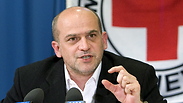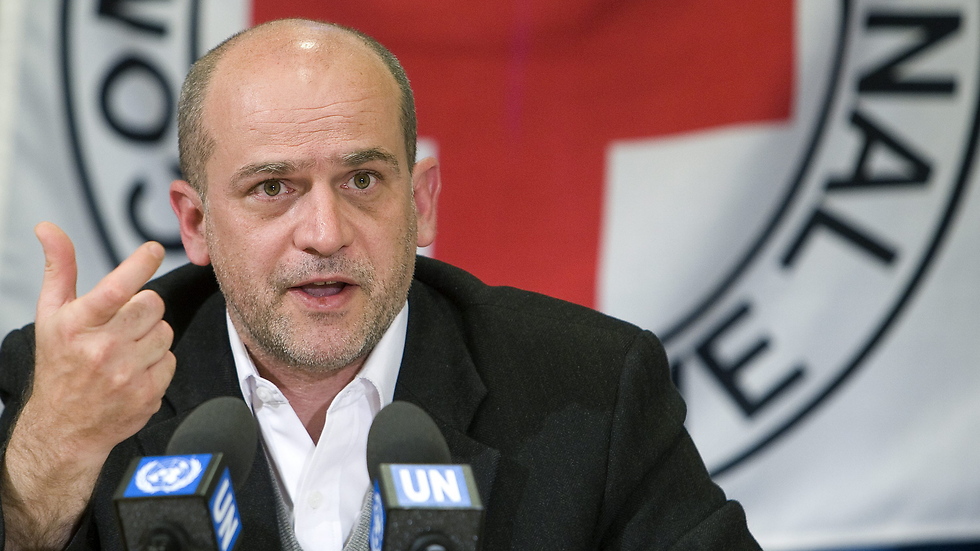
ICRC official: Israel is not an apartheid state, but there is occupation
Jacques De Maio, who heads the International Committee of the Red Cross delegation to Israel and the PA, asserts: 'There is no IDF order to shoot suspects to kill,' while at the same time warns of the humanitarian damage caused by occupation.
More than 12,000 Red Cross personnel (I will use the expression "Red Cross" instead of "International Committee of the Red Cross") operate in the field in 80 countries, and deliver essential assistance to millions of people affected by conflicts and disasters. They come to them with food, clothing and medical assistance, while risking life and even losing life. In Syria, Somalia, Ukraine, Haiti and other areas of war, hunger and conflict.
The Red Cross has been in Israel since 1948 and expanded its presence to the disputed territories in 1967. Nevertheless, "We still have to explain to the Israeli public who we are, what we're looking for here and what are our principles," said Jacques De Maio, the head of the Red Cross delegation to Israel and the Palestinian Authority.
A native of Switzerland, 53 years old, articulate and thoughtful, fluent in many languages, De Maio has gained personal experience in Red Cross relief and rescue operations in the most repressive and dangerous places around the globe: Afghanistan, Rwanda, Uganda, Somalia, Kuwait, Latin America and more.
"The most complicated thing," he said in a rare interview, "is to preserve the basic principles of the Red Cross, neutrality and not take a stand in situations where each side believes that morality and justice are on their side and requires us, the Red Cross, to identify with them and condemn the other.
"How can you, I was and am asked, relate with the same compassion to the aggressor and the aggressed? To the terrorist and the one fighting terrorism? And I reply: We are extending help to people, wherever they are, who are in need of our assistance. Most of our work is done quietly, without advertising, sometimes in secret, and with the sole aim to protect the natural rights of the human beings. Not doing politics. The fending off of politics and political manipulations is consuming too much of our time and resources."
As an example of an attempt at political influence, De Maio points to the Red Cross's response to two of the claims that are being made against Israel: That it is an apartheid state and that it carries out "extrajudicial killings."
"In contrast to the security systems in many countries, including Western ones, Israel allows us rapid access to senior military, prison and other security services," he said. "We have a productive, efficient and professional dialogue with them. We checked with them the question of the shooting of perpetrators of terror attacks, and we came to the unequivocal conclusion that there are no shoot to kill orders of suspects by IDF, as some political elements tried to convince us. Rules of engagement have not changed, and became even stricter. True, there are wrong decisions of individual soldiers and there are many instances of outrageous behavior at checkpoints, sometimes against the explicit instruction. We did not hesitate to report this to the IDF and we usually receive a substantive response. So that we rejected the accusation, and immediately there were those who claimed that we were whitewashing IDF war crimes and serving the Zionists."
And what about the claim that Israel is an apartheid state?
“The Red Cross was very familiar with the regime that prevailed in South Africa during the apartheid period, and we are responding to all those who raise their claim of apartheid against Israel: No, there is no apartheid here, no regime of superiority of race, of denial of basic human rights to a group of people because of their alleged racial inferiority. There is a bloody national conflict, whose most prominent and tragic characteristic is its continuation over the years, decades-long, and there is a state of occupation. Not apartheid.”
The International Committee of the Red Cross (ICRC) differs from the Red Cross and Red Crescent Movement, which is a federation of national Red Cross, Red Crescent (in Muslim countries) and also MDA, whose relations with the Red Cross and Red Crescent Federation were regulated only in 2005 upon its acceptance as a full member. The ICRC, on the other hand, is a non-profit corporation registered in Switzerland. As the date of its birth, the Committee notes the founding meeting of the humanitarian activists in Geneva in mid-February 1863. A year and a half later, the European governments adopted the first Geneva Convention, which mainly extends assistance to war casualties and prisoners of war. The idea was conceived by Henri Dunant, a tragic figure of a tireless human rights activist who had become heavily indebted and ended his life as a homeless beggar. Today, the Red Cross is managed by a board of directors composed entirely of Swiss public figures.
Choose the good
On the eve of Holocaust Remembrance Day, there is room for mentioning the terrible helplessness of the Red Cross against the Holocaust. "The greatest failure in the history of the ICRC," the Red Cross's official history notes, "happened during the Holocaust ... The organization failed to save Jews from the German extermination machine, was unaware of the horrors, did not expose them and did not prevent them."
In a founding speech in April 2015, the President of the International Red Cross, Peter Maurer, said: "Tragically, the leaders of the Red Cross were at the time (of the Holocaust) with those who stood by ... The leaders of the organization have failed immensely with their total misunderstanding of the murderous nature of the Nazi regime. That is why the Red Cross looked on (during the Holocaust) with no acts and no voice. The humanitarian organization failed because it lost its moral compass."
The Red Cross did not have access—nor did it make much of an effort to get it—to the killing grounds in Germany, Poland, Ukraine, Lithuania, Latvia and Russia. The organization's efforts—limited to begin with—to save Jews in Romania and Hungary in 1943-1944 had minimal success.
Toward the end of the war and afterwards, and in the wars that have taken place since then, the Red Cross has played a central role in the exchange of POWs, locating missing persons and family reunification.
At the end of the 1940s, the Red Cross's mandate for the protection of civilians during wartime and occupation was extended as a result of the Fourth Geneva Convention and comprehensive international humanitarian legislation.
Israel is a signatory to the Geneva Conventions. Although the Israeli governments has refused since 1967 to apply the Fourth Convention to the territories of the West Bank and Gaza on the grounds that they are not "occupied territories," the Israeli legal system treats these areas and what is done there based on the principles of that convention.
Today, the Israeli branch of the Red Cross—including in the territories—has about 360 employees, both Israelis and foreigners, and a budget of $55 million a year. The Red Cross, De Maio said, takes care of more than 7,000 prisoners and security prisoners, meets privately with their representatives, and critically examines their conditions of detention, which must "be in accordance with international rules." They organize and fund relatives' visits of Palestinians imprisoned in Israeli jails and in the territories, help the victims of shelling in Gaza (and are ready to help the victims of the shelling in Israel as well, De Maio stressed), and "look closely at the humanitarian damages of the settlements," when there are any.
"The Red Cross does not intend to tell Israelis where to live, it is their political decision," De Maio said. "But if this is accompanied by ongoing humanitarian damages to Palestinian residents, it is our duty to alert about it."
The recent hunger strike of Palestinian prisoners has put the local Red Cross delegation to organizational, practical and PR test. To the question "What can the Red Cross do when a hunger strike breaks out?" The following official answer is given: "The ICRC does not judge whether hunger strikes are justified or legitimate as a means of protest, nor does it participate in the negotiations between the authorities and the detainees regarding the hunger strike. It urges the detention authorities and the detainee himself to find a solution and at the same time strives to ensure that the rights of the hunger strikers and their physical and mental integrity are respected, including the choice to continue or abandon the hunger strike and that they are provided, with their consent, with appropriate attitude and treatment."
It is evident that De Maio has a strong will to prove the absence of any bias, to avoid any deviation from the universal principles. He repeatedly emphasized the ICRC's "exceptional" access to "commanders, decisions, facilities and events" in the IDF and IPS. He praised the deepening internalization, as he puts it, of the principles of international humanitarian law in the "Israeli side."
On the other hand, the Red Cross is trying to influence radical Islamic organizations to adopt, if only partially, humanitarian law. To this end, after Operation Protective Edge, it organized workshops on the rules of war for groups of Hamas members—but not very successfully, according to a New York Times reporter who was allowed to attend one of them. Recently, the Red Cross held a conference on the same subject at the Islamic University in Gaza, where "important clerics, some from afar via Skype, explained that there is no contradiction between Islam and the Geneva Conventions."
Nevertheless, there is no moral equivalence between terrorism and the fight against terrorism.
"Every one of us at the Red Cross has his own moral judgment. In my capacity, I read reports about prisoners in different parts of the world, about what they did, and I was horrified when I had to ask to treat them humanely. But that is the essence of my job. Even despicable murderers are entitled to be treated according to the Geneva Convention and humanitarian law. Otherwise, what is the moral difference between them and us? With an organization like ISIS, whose worldview is based on killing people, we have no dialogue and no ties, but we will also be willing to talk with people from ISIS to save lives."
"The Red Cross has no obsession with Israel" De Maio stressed. "In a clear voice, I do not hesitate to reject the comparisons and parallels made between the situation here and Somalia, Sudan, Yemen or countless of other hot spots around the globe. However, we will not just give you permission for the continued control of another people, and we will not agree to serve as a scapegoat. Not yours, not of the Palestinians, nor of anyone else. We do not work for countries, we do not work for regimes, we work for humans."
I asked De Maio what he had learned during his years of work with the International Red Cross, in his missions to dark corners of the world. "I learned to not rush to judge people," he answered after some reflection. "I learned how easily decent people can become the most despicable—and how many are the silent heroes of humanity. Ordinary people who refuse to sign orders that could legitimize oppression, killing, exile, discrimination. In their refusal, they are exposed to persecution and torture."
"The quiet acceptance of evil," said De Maio, "is what allows evil to rule. No one is immune to it. The choice to do good or at least to refrain from doing evil is yours, mine, ours."











